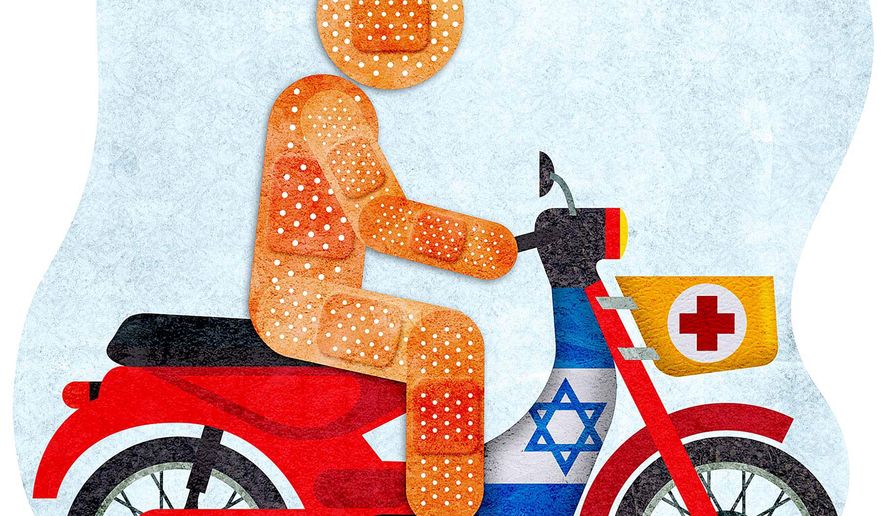OPINION:
According to the Centers for Disease Control and Prevention, the United States has the highest motor vehicle crash death rate among high-income countries, with nearly 37,000 deaths annually, or about 100 per day. Though responders often have just minutes to save a person’s life, average ambulance response time is 15 minutes, 19 seconds.
This is a serious problem, but U.S. emergency responders should know that help is on the way. A small country that most people could hardly locate on a map has not only solved the problem, but can help every major American city do the same.
United Hatzalah (“rescue” in Hebrew) provides Israelis with rapid, professional, pre-ambulance emergency care with a record-breaking average response time of three minutes — and in major cities across Israel, often 90 seconds. The organization’s free services are available to all 24 hours a day, seven days a week.
To achieve these spectacular results, the organization’s founder, Eli Beer, had to solve two problems. First, he needed to construct a highly trained network of people all over the country. Second, he had to create a system to ensure that medics would be able to treat victims almost immediately.
With the help of Dr. Avi Rivkind, who heads the Shock and Trauma Unit at the Hadassah Medical Center in Jerusalem, Mr. Beer decided that all Hatzalah medics would undergo a six-month, 200-hour first aid course. Candidates had to be over 21 and have a driver’s license and a clean police record.
“Medics, paramedics and ambulance drivers play a crucial role in emergency medical care,” says Dr. Rivkind, who serves as the unofficial chief medical adviser for Mr. Beer’s organization. “Their professionalism determines the patients’ chances of survival, the pace and extent of their recovery.”
As more Hatzalah medics received training, however, Mr. Beer became increasingly frustrated with their inability to help those in need. Many drove cars and were delayed by parking problems and traffic jams. Hatzalah’s founder developed an innovative solution.
In late 2001, he was stuck in traffic and began to chat on his phone. Before he knew it, a motorcycle cop pulled up next to him, knocked on his window and gave him a ticket. Mr. Beer was mightily annoyed, but the incident sparked a unique idea: Volunteers should ride motorcycles so they could weave through traffic and park anywhere.
Mr. Beer went home and told his wife, who created the name “ambucycle.” Soon, Mr. Beer began to refit motorcycles as mini-ambulances, and today each one contains a trauma kit, an oxygen canister, a blood sugar monitor and a defibrillator. The vehicles aren’t sexy, but like their innovator, they get the job done.
Hatzalah and its ambucycles are not meant to replace traditional ambulances and paramedics, which are critical to helping those in need, but they do enable EMTs to arrive at the scene faster to provide first aid. As Mr. Beer puts it, they are “a lifesaving flash mob.”
The heart and soul of Mr. Beer’s organization is its Uber-like app for emergency responders. Since 2008, Hatzalah has made available to its EMTs a standardized GPS smartphone app. The system draws a perimeter around an incident and alerts the five closest volunteers through a series of loud beeps on their phones.
Anyone in Israel who identifies an emergency can call a toll-free number, and the United Hatzalah nerve center then blasts out the alert. All of the group’s EMTs, Mr. Beer says, are guided by the same principle: “Think about every single patient like he’s your own mother or father. Run to him like he’s your own son.”
When Mr. Beer started United Hatzalah, many thought he was crazy, but no one thinks that anymore. Hatzalah volunteers treat approximately 245,000 Israelis annually, including 27,000 children. A quarter of the calls the organization fields are for life-threatening situations.
“United Hatzalah is the essence of saving human lives before anything else,” says Harvard Law Professor Alan Dershowitz. “It grows out of the heart and souls of people who just want to do good. There is no reward more important than the knowledge that you made the difference between life and death.”
There is no reason why the United Hatzalah model cannot succeed in the United States. Jersey City, New Jersey, has already implemented the program successfully. It’s time for other major U.S. cities to follow suit. Mr. Beer and his fellow volunteers are keen to help grow their model.
To make this a reality, cities will need to provide access to 911 data and get the support of firefighter and EMS unions, and mayoral backing will be the linchpin. Good Samaritan laws protect volunteers saving lives. Some elected officials have expressed concern that volunteers would get hurt while responding to a call, but surely for something this important a solution can be found that addresses their concerns.
A question for members of Congress and the mayors of Chicago, Los Angeles, New York, San Francisco and Washington, D.C.: Which of you will adopt this model in your states and cities next? As Beer notes, “We just need a good idea, motivation and lots of chutzpah.”
• Avi Jorisch is a senior fellow at the American Foreign Policy Council in Washington, D.C., and the author of “Thou Shalt Innovate: How Israeli Ingenuity Repairs the World” (Gefen Publishing, March 2018).
CORRECTION: This article originally cited an incorrect statistic for motor vehicle crash death rates. The correct number is 37, 000 deaths annually, or about 100 per day.




Please read our comment policy before commenting.